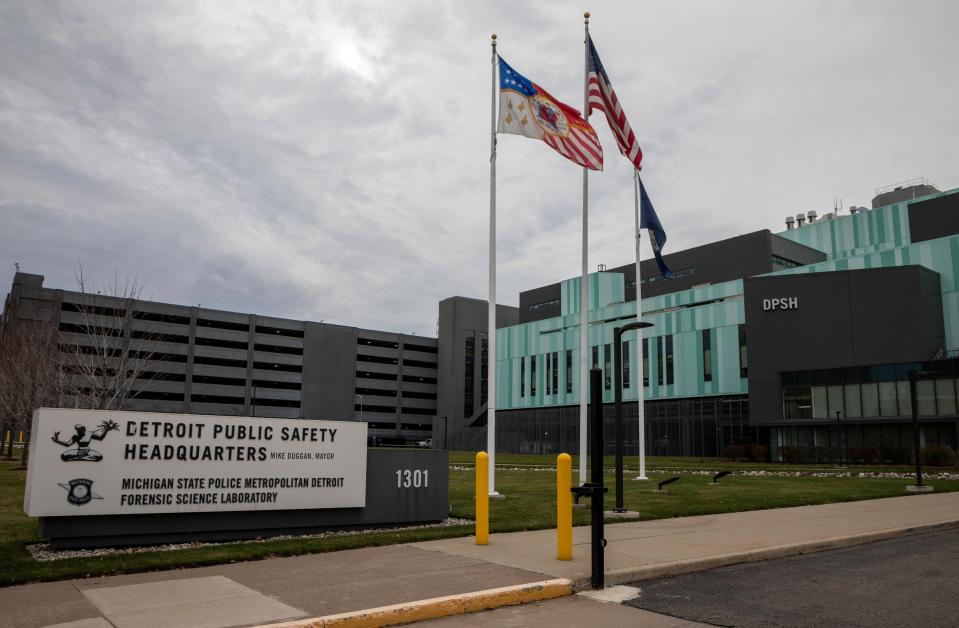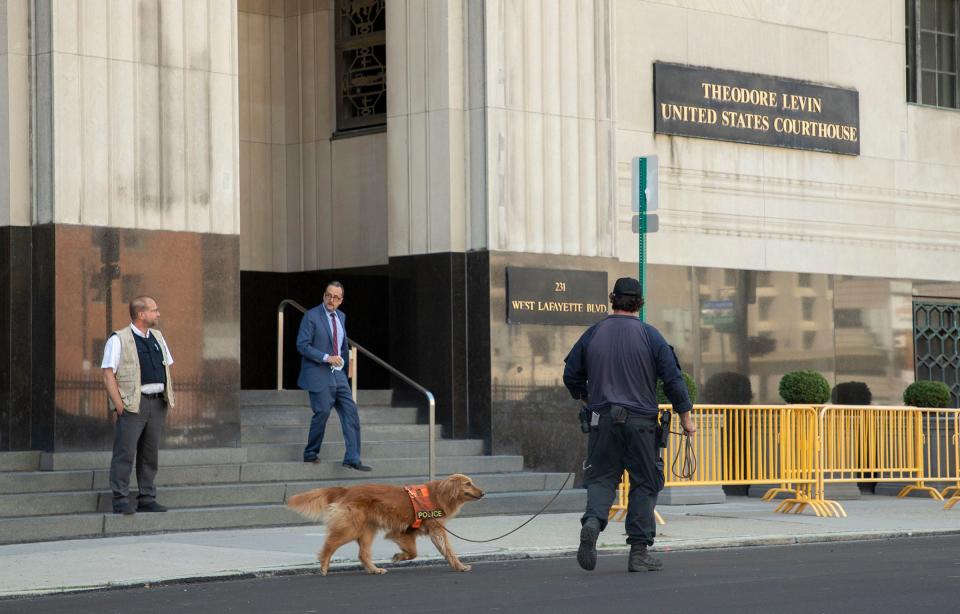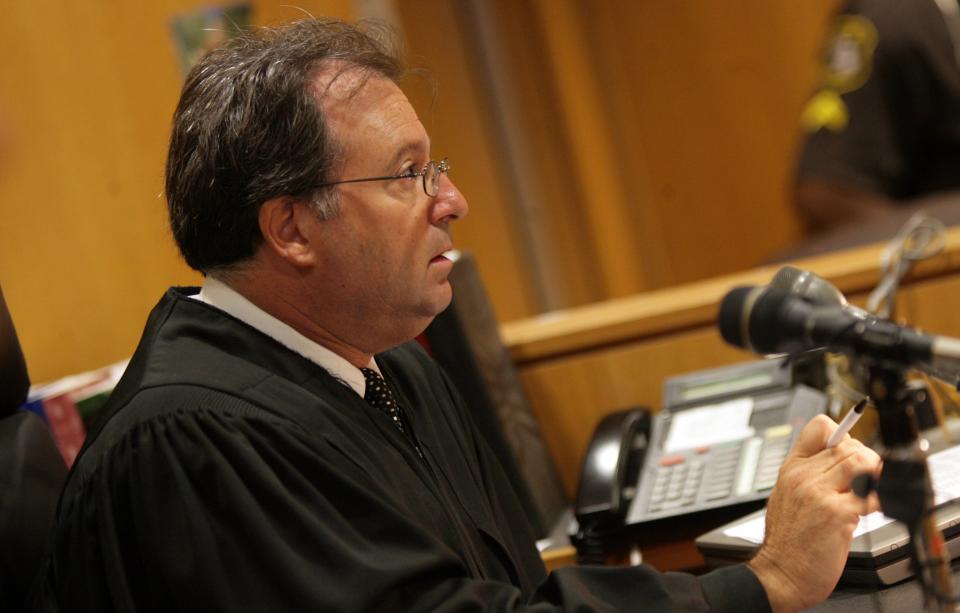5 years later, Detroit officers and others still await sentencing for roles in scheme
It was once a lucrative side gig for two now-retired Detroit police officers. But their moneymaking venture turned out to be illegal, and the FBI came knocking at their doors.
The scheme involved secretly downloading the department's police reports about vehicle crashes before the reports were publicly available. The officers sold the "unapproved" reports to two men — a father and son in Oakland County — for use in soliciting the accident victims for medical and legal services.
Prosecutors say the scheme amounted to fraud and theft, lasted from late 2012 until spring 2018 and netted the officers more than $375,000 in payments. Over time, the chain of people who received or profited from the police reports grew and came to include some personal injury attorneys.

Eventually the authorities caught on. So far, there have been plea deals or guilty verdicts for eight people whom federal prosecutors have linked to the cash-for-crash reports scheme. Related charges against three other people, including an attorney, have been either dropped or dismissed.
Yet nearly five years since the initial group of four defendants pleaded guilty for their respective roles in the scheme, the two retired officers who took the reports and the father and son who first received them are still in a state of limbo and awaiting sentencing.
A likely reason for the unusually long wait is that their plea deals included cooperation agreements with the government, and the government still has pending criminal cases against other defendants who prosecutors say had roles or benefitted from the police reports scheme.
One of those cases involves a lawyer with a Southfield-based law firm, Auto Accident Attorneys, whom a jury last fall found guilty of conspiracy to commit wire fraud.
All four of the initial defendants — retired police officers Karen Miller and Carol Almeranti, Robert Rosett and his adult son Jayson Rosett — testified during that late October jury trial.
But lawyers for the Southfield personal injury attorney, Glenn P. Franklin, as well as a businessman, John Angelo, who was also found guilty and who prosecutors say was involved in selling the police reports to Franklin, have since sought to toss the verdicts and requested a new trial. (They contend, among other things, that there is insufficient evidence that they knew the police reports were obtained through fraud and that the reports weren't actually "property.")
And there is another possible trial starting June 12 that is related to the original case and involves tax and fraud charges against an area businessman and an associate. Court documents say the initial four defendants may need to testify, so the government has asked that their sentencing wait until that trial is over.
Their sentencing hearing dates, rescheduled numerous times since 2019, are currently set for June 25.
Long delays
William Ortman, an associate professor at Wayne State University Law School, said the typical reason for long delays between a defendant's pleading and sentencing is their cooperation. Defendants can get more lenient sentences by agreeing to cooperate with the government.
"Although it’s possible for someone to get sentenced, then cooperate, and then have a sentence reduction, the more common practice in federal court is to delay sentencing until the cooperation — often meaning trial testimony — is complete," Ortman said. "The five-year delay here is on the long side, but that’s just because it’s taken a decent amount of time to bring the (other) cases to trial."
All of the cases predate a June 2019 overhaul of Michigan's no-fault auto insurance system aimed at lowering insurance premiums, in part through new price controls on medical provider charges that had been an incentive for fraud.
Prior to the overhaul, motorists would sometimes become targets of solicitation schemes following accidents and find themselves in no-fault insurance patient mills, steered toward particular clinics, MRI centers, therapists and transportation providers — and with accident attorneys standing to gain one-third share of the total medical billings paid by insurance.

Precisely what effect the overhaul has had on the prevalence of no-fault insurance fraud is unclear.
The new price controls put limits on the upside to medical billing, which before the controls could be an incentive for fraud.
For example, a 2017 Free Press investigation found some metro Detroit medical providers charging as much as $5,000 per MRI image, which was allowed and not considered fraudulent. But under the 2019 reform, providers are generally limited to 190% of what Medicare would pay for the same service or procedure — plus any extra reflecting medical inflation.
For a lower extremity MRI in the Detroit area, the Medicare rate is now generally between $208 and $300 per image (not counting any additional fees), according to a copy of the Centers for Medicare & Medicaid Services' Physician Fee Schedule. So for an MRI that would cost Medicare $208, a provider may charge no-fault insurance about $435 (190% of $208, plus 10% for inflation).
The Michigan no-fault overhaul law did permanently establish a Fraud Investigation Unit inside the state's Department of Insurance and Financial Services. The unit investigates all types of fraud related to insurance or financial services, with 85% of the complaints it received last fiscal year related to auto no-fault. The unit works with law enforcement and reported netting about a dozen criminal convictions that year and over $500,000 in restitution.
The Insurance Alliance of Michigan, an industry group, says it has been working with the new fraud investigation unit by sending them questionable auto insurance claims.
Lawyer pleads guilty
In yet another related case, attorney Mathew Schwartz, owner and operator of the Southfield-based law firm Legal Genius, pleaded guilty in October 2020 to conspiracy to defraud the Internal Revenue Service and steal from an organization — the Detroit Police Department — that receives federal funds. He also agreed to cooperate as part of his plea deal and has yet to be sentenced.
During the trial last October of attorney Franklin and businessman Angelo, Schwartz testified how he had known Jayson Rosett since the early 1990s, back when Rosett had a coffee shop in downtown Birmingham.
Schwartz said he started paying Rosett for providing him police reports in mid-2015, with money Schwartz said he received from Angelo and Angelo's business partner in exchange for passing them the reports.
Schwartz said in court he only had a middleman role and that Angelo and his business partner would pay him cash for the reports, eventually about $2,500 per week. Schwartz said he would then leave the money in his backyard barbecue grill for Jayson Rosett to pick up.
Schwartz testified that he never kept any of the cash that was exchanged. His own benefit came later, he said, through client referrals from a different law firm connected to a woman who was dating Angelo's business partner.
New details emerge at trial
The two Detroit officers, Miller and Almeranti, also took the stand during last fall's trial and offered previously unreported details about the cash-for-crash reports scheme.

This included how they allegedly got the idea to start downloading and selling the department's police reports from a now-retired Wayne County judge, who was said to be friends with the elder Robert Rosett.
Prosecutors say the officers would download and send batches of 20 to 30 "unapproved" police reports every day to the Rosetts. It would have been impossible for any member of the public to obtain so many reports, and especially not before they had been approved by a department supervisor.
The department at the time sold approved versions of police reports on vehicle accidents to the public for $17 each, with $10 going to the department and $7 to the database provider LexisNexis.
For someone in the business of offering medical or legal services to accident victims, this early peek at "unapproved" police reports was an opportunity to get a jump on the competition by targeting potential clients before others could, federal prosecutors said.
Helping a friend
Miller testified that she was close to retirement in 2012 when Wayne County Circuit Judge David Groner, whom she knew from her work obtaining search warrants, asked her if she was interested in working for the county. She said that she wasn't interested, according to a transcript of her testimony, and the judge suggested a different type of post-retirement gig.

"He said, 'Well, I have my best friend — I need a real honest, good-working person — and I would like to introduce you to my friend, Bob — Robert Rosett,' " Miller said, according to the trial transcript. “We sat down and I asked him, I said what did you want — what are we meeting about? He said, 'Well, my best friend's son is opening up a rehab facility in Michigan and he needs clients, so I need to — he needs clients.' And I said, Well, how does he — how does he get clients? He said, 'Well, through accident reports.' I said, OK."
In her testimony, Miller recounted how she turned to one of her good friends in the department, Almeranti, who was more familiar with the police reports database.
A Grosse Pointe meeting
According to Miller's testimony, Judge Groner set up an in-person meeting in or around June 2012. The meeting involved the judge, Robert Rosett, Miller and Almeranti and took place in a Grosse Pointe restaurant.
"We sat down and we talked about it, and we just worked out ways to get this client — to get Robert Rosett's son clients," Miller said.
Almeranti had similar recollections at the trial as to how she and Miller first got involved in obtaining police reports and sending them to the Rosetts.
"I was told by Mr. Rosett that his son owned a physical therapy business and that he wanted the accident reports in order to, like, cold call, for his son to get business," she testified.
Almeranti said she gave Miller her login and password to the police reports database so that she too could remotely access the reports. Miller needed Almeranti's login credentials because she had retired from the department in late June 2012.
The officers took turns downloading and sending reports to the Rosetts, starting off at five days per week and eventually up to seven days.
To compensate the officers for their services, Robert Rosett testified at the trial, he set up a joint banking account with Almeranti that they used for payments and withdrawals.
Miller said that she and Almeranti split the money they received about 50/50.
'All aboveboard'
Both officers claimed in testimony that at first they didn't think the cash-for-crash reports scheme was improper, based in part on assurances from Groner.
"I was told by Judge Groner that it was all aboveboard," Almeranti said, according to a trial transcript. She and Miller continued to provide police reports to the Rosetts until mid-April 2018, Almeranti said, as "that's when FBI came to my door."
Groner, who retired as a judge at the end of 2022, hasn't been accused by authorities of any wrongdoing. There was no evidence presented at last fall's trial that he received any financial benefit from the arrangement between the officers and the Rosetts.
Attorney Pamella Szydlak said in a statement to the Free Press on behalf of Groner that she read the trial testimony "and hotly dispute(s) what was said happened more than 14 years ago. The witnesses have all pled guilty for their own actions, and their stories are self-serving, exaggerated and unreliable."
More recipients
Prosecutors say the Rosetts were the first recipients in what grew to be a long sequence of people who came in contact with the illegally obtained police reports.
Jayson Rosett, who also pleaded guilty in May 2019 alongside his father and the two officers, testified as well during last fall's trial. He recounted owning physical therapy businesses, and how from 2009 to 2014, he used police reports obtained from various sources to solicit accident victims to be his patients or become clients for law firms.
Early on, he said, he obtained police reports from an employee inside the Detroit Police Department who wasn't Miller or Almeranti. Later, he got them from a database by using the login credentials of an attorney he knew.
Rosett recounted how he also had another business called Accident Information Bureau. He set it up in about 2009 at the suggestion of a friend, Mark Radom, whom he had known since high school and was at the time a brother-in-law to prominent metro Detroit attorney Mike Morse.
Accident Information Bureau would then sell police reports to a chiropractic firm that Radom was connected to, Rosett said.
But eventually the police reports database began to limit how many reports a single user could download. Rosett said he then asked his father, Robert Rosett, if he might be able to help, because he knew that his father was friends with Groner.
Once the cash-for-crash reports scheme with the two Detroit officers began in mid-2012, Jayson Rosett said he personally called up accident victims in the reports to solicit them for his physical therapy clinics. He also sold reports to personal injury lawyers that he knew, he said.
But by about July 2014, Rosett said he stopped personally soliciting the accident victims in the reports, even though the reports were still coming in from the two officers.
He gave the police reports to "a prominent attorney," Jayson Rosett testified. "A name like Mike Morse."
Under further questioning from a government lawyer, Rosett said attorney Mike Morse was indeed one of his clients for the police reports coming in.
Rosett said he also began an arrangement with another metro Detroit attorney, Schwartz of Legal Genius, in which Schwartz paid him in cash — generally about $5,000 a week, stashed in the backyard grill — in exchange for the police reports. (Schwartz pleaded guilty in October 2020.)
Morse has not been accused of any wrongdoing in the criminal case.
Allegations of a business relationship between Jayson Rosett and Morse first surfaced in an earlier, noncriminal civil case in U.S. District Court that was brought by State Farm Insurance against 18 defendants that included medical clinics, chiropractors and businessmen including Jayson Rosett.
A judge dismissed the lawsuit in early 2020. When the lawsuit was still active, attorneys for Morse contended there was no evidence Morse knew his law firm received any illegally obtained police reports from Rosett, as the firm regularly gets police reports that are stamped "unapproved" from insurance companies when handling clients' lawsuits, as well as through Freedom of Information Act requests.
Antisolicitation law
Some prominent personal-injury law firms have in the past used police reports to contact potential clients at home through targeted letters sent to their address. This marketing practice is allowed under Michigan law and rules of professional lawyer conduct, as such letters contain information intended for individuals who are facing a legal issue and may benefit from representation.
The cash-for-crash reports scheme at the center of the ongoing criminal cases dates to before Michigan laws took effect in January 2014 that made it illegal to access or buy police reports of auto accidents for solicitation use in the first 30 days after a crash, or to solicit a crash victim for commercial purposes during that first month.
The cases nevertheless cover periods of time after those new laws were in effect.
Even so, the police officers and alleged recipients of their reports haven't been charged with violating Michigan's antisolicitation laws, a misdemeanor offense. Rather, the officers pleaded guilty to one count of conspiracy to defraud the IRS and a count of conspiracy to commit theft from an organization receiving federal funds — the Detroit Police Department.
Attorneys for Miller, Almeranti and Jayson Rosett either declined comment or didn't respond to comment requests for this story. An attorney for Robert Rosett said that he is looking forward to concluding this chapter of his life.
Attorney Arnold Fink, who represented personal injury lawyer Glenn Franklin at last fall's trial, said the government's decision to charge Franklin with conspiracy to commit wire fraud could ultimately backfire. Franklin and Angelo are both seeking to toss the jury's verdict and get a new trial.
"Whatever their reasons, they didn’t charge him with solicitation and they charged him with a gigantic conspiracy with all these people — and that’s where the problem has been for the government on this," Fink said. "So I anticipate that with the expertise of the appellate lawyers who he now has, don’t be surprised if he’s not guilty.”
Federal attorney Mark McDonald of the Justice Department's Tax Division, who is prosecuting the case, declined to comment for this story.
Contact JC Reindl: 313-222-6631 or jcreindl@freepress.com. Follow him on X @jcreindl.
This article originally appeared on Detroit Free Press: 5 years later, Detroit officers and others still await sentencing

